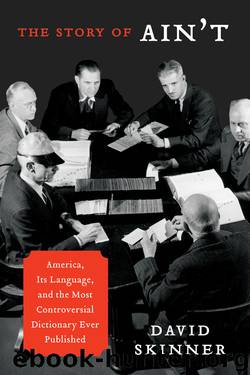The Story of Ain't by David Skinner

Author:David Skinner
Language: eng
Format: epub
Publisher: HarperCollins
Published: 2012-10-01T04:00:00+00:00
Chapter 26
When Webster’s gives two pronunciations, the joke went, the first pronunciation is Boston and the second is New England. Gove, now general editor of Merriam, attributed the remark to a college professor in Kentucky, which would have made sense, as Merriam-Webster dictionaries had long neglected the southern accent.1 Yet it could have originated with Merriam’s own staff, who gladly repeated the line. Because it was true.
The pronunciations in Webster’s Second were not international or even national; they reflected a regional bias that had seemed perfectly correct when American intellectual culture was still a footnote to Boston culture, but not anymore. What made sense in Ralph Waldo Emerson’s day had become outdated and provincial in the age of Faulkner and Steinbeck and the New York intellectuals, as American standards of speech and pronunciation were being influenced first by radio and then Hollywood.
Since the early 1930s, a decent variety of accents played in Hollywood movies. Many performers adopted a hoity-toity Anglophone style of pronunciation, of a kind long encouraged in American theatrical training but later used for the comic shaming of those who put on airs. Society accents could be heard from Joan Crawford of Texas and Oklahoma, Clark Gable of Ohio, William Powell of Pennsylvania, Cary Grant of Bristol, England, and Katharine Hepburn of Connecticut, at best giving the actor a smart, Waspy edge of old-fashioned class. A competing American naturalism was heard in the place-specific accents of Humphrey Bogart (born in New York City), James Stewart (borough of Indiana, Pennsylvania), Spencer Tracy (Milwaukee), Henry Fonda (Grand Island, Nebraska), and John Wayne (Winterset, Iowa). Certain genres, detective and gangster films, worked against the old-fashioned proper way of talking. Uppity pronunciation faded gradually. In the 1940s and ’50s, the newer movies used more soldiers than socialites, and more cowboys than anything else.
After the release of Webster’s Second, Merriam had tested the market for more representative pronunciation guidance by publishing and distributing a slim pronouncing dictionary that had been developed out of house by John S. Kenyon and Thomas A. Knott. Kenyon was an esteemed phonetician and Knott, of course, was a former general editor at Merriam, the most senior editor after William Allan Neilson, but, unlike Neilson, an actual full-time lexicographer.
Kenyon and Knott’s book used the International Phonetic Alphabet, breaking each word into phonemes represented by letters and symbols, some strange-looking, like the upside-down and backward e symbol—ə—called a schwa, which actually represented a range of vowel sounds that might commonly be spelled with an e or an i or even an o, but described as the second vowel in custom. The system took getting used to—the letter i stood for the long “e” sound as in bee, while the letter e stood for the long “a” sound as in rate—but the dictionary eased the way by including a key line on each page, referencing each symbol to the sound of a familiar short word.
The pronouncing dictionary sought to correct the stuffy New England bias of Webster’s Second, replacing its standard of “formal platform speech” with a preference for “cultivated colloquial English.
Download
This site does not store any files on its server. We only index and link to content provided by other sites. Please contact the content providers to delete copyright contents if any and email us, we'll remove relevant links or contents immediately.
4 3 2 1: A Novel by Paul Auster(12392)
The handmaid's tale by Margaret Atwood(7763)
Giovanni's Room by James Baldwin(7346)
Asking the Right Questions: A Guide to Critical Thinking by M. Neil Browne & Stuart M. Keeley(5775)
Big Magic: Creative Living Beyond Fear by Elizabeth Gilbert(5771)
Ego Is the Enemy by Ryan Holiday(5448)
The Body: A Guide for Occupants by Bill Bryson(5096)
On Writing A Memoir of the Craft by Stephen King(4944)
Ken Follett - World without end by Ken Follett(4732)
Adulting by Kelly Williams Brown(4574)
Bluets by Maggie Nelson(4556)
Eat That Frog! by Brian Tracy(4540)
Guilty Pleasures by Laurell K Hamilton(4449)
The Poetry of Pablo Neruda by Pablo Neruda(4107)
Alive: The Story of the Andes Survivors by Piers Paul Read(4033)
White Noise - A Novel by Don DeLillo(4010)
Fingerprints of the Gods by Graham Hancock(4004)
The Book of Joy by Dalai Lama(3986)
The Bookshop by Penelope Fitzgerald(3853)
